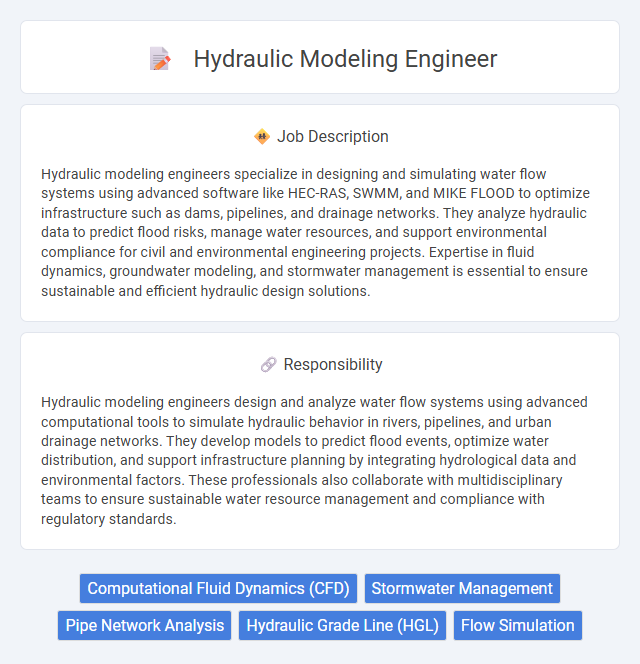
Hydraulic modeling engineers specialize in designing and simulating water flow systems using advanced software like HEC-RAS, SWMM, and MIKE FLOOD to optimize infrastructure such as dams, pipelines, and drainage networks. They analyze hydraulic data to predict flood risks, manage water resources, and support environmental compliance for civil and environmental engineering projects. Expertise in fluid dynamics, groundwater modeling, and stormwater management is essential to ensure sustainable and efficient hydraulic design solutions.
Candidates with strong analytical skills and a passion for fluid dynamics are likely to thrive as Hydraulic Modeling Engineers. Those comfortable working with complex software and iterative simulations might find this role well-suited to their abilities. Individuals preferring hands-on fieldwork over computer-based analysis may find the job less aligned with their strengths.
Qualification
A Hydraulic Modeling Engineer requires a strong background in civil or environmental engineering, with specialized expertise in hydrodynamics, fluid mechanics, and computational modeling software such as HEC-RAS, MIKE 21, or SWMM. Proficiency in data analysis, GIS integration, and experience with flood risk assessment or water resource management projects are essential. Advanced degrees or professional certifications in hydraulic engineering enhance a candidate's qualifications and demonstrate expertise in developing accurate simulation models for infrastructure planning and environmental impact studies.
Responsibility
Hydraulic modeling engineers design and analyze water flow systems using advanced computational tools to simulate hydraulic behavior in rivers, pipelines, and urban drainage networks. They develop models to predict flood events, optimize water distribution, and support infrastructure planning by integrating hydrological data and environmental factors. These professionals also collaborate with multidisciplinary teams to ensure sustainable water resource management and compliance with regulatory standards.
Benefit
Hydraulic modeling engineers probably enjoy significant benefits including competitive salaries and opportunities for professional growth in infrastructure and environmental projects. They are likely to gain hands-on experience with advanced simulation software, which enhances their technical expertise and problem-solving skills. Job stability and the potential for contributing to sustainable water management systems might also be key advantages in this role.
Challenge
Hydraulic modeling engineers likely face challenges related to accurately simulating complex water flow systems under varying environmental conditions. The probability of encountering issues with data limitations or computational constraints is high, requiring innovative problem-solving skills. Managing project deadlines while ensuring model precision often adds further complexity to their role.
Career Advancement
Hydraulic modeling engineers specialize in simulating fluid behavior within water resources and infrastructure systems, leveraging skills in computational fluid dynamics and software such as HEC-RAS and MIKE 21. Career advancement opportunities include progressing to senior engineer roles, project management positions, and specialized consultancy, often requiring enhanced expertise in environmental regulations and advanced modeling techniques. Gaining certifications like Professional Engineer (PE) or becoming proficient in emerging technologies such as AI-driven simulations significantly boosts professional growth and leadership potential in this field.
Key Terms
Computational Fluid Dynamics (CFD)
Hydraulic modeling engineers specialize in Computational Fluid Dynamics (CFD) to simulate and analyze fluid flow behavior in hydraulic systems, optimizing designs for pipelines, pumps, and turbines. Proficiency in CFD software such as ANSYS Fluent, OpenFOAM, or STAR-CCM+ enables accurate prediction of pressure distribution, velocity fields, and turbulence effects in complex geometries. Expertise in meshing techniques, turbulence modeling, and transient flow analysis is critical for validating hydraulic performance and improving system efficiency.
Stormwater Management
Hydraulic modeling engineers specializing in stormwater management design and simulate drainage systems to optimize flood control and water quality. They use advanced software tools like HEC-RAS, EPA SWMM, and MIKE SHE to analyze runoff patterns and predict hydraulic behavior in urban and natural environments. Their expertise ensures compliance with regulatory standards and supports sustainable infrastructure planning for effective stormwater conveyance and treatment.
Pipe Network Analysis
Hydraulic modeling engineers specializing in pipe network analysis use advanced software tools to simulate and optimize water distribution systems, ensuring efficient flow and pressure management. They analyze complex pipe networks to predict hydraulic behavior, detect leaks, and evaluate system performance under various conditions. Expertise in EPANET, WaterGEMS, and Bentley software enhances their ability to design resilient infrastructure for urban water supply and wastewater management.
Hydraulic Grade Line (HGL)
A Hydraulic Modeling Engineer specializes in analyzing and designing water flow systems by accurately calculating the Hydraulic Grade Line (HGL), which represents the energy level along a pipe or channel. Precise HGL assessment ensures optimal pressure management, prevents pipeline failures, and supports efficient water distribution in urban infrastructure and environmental projects. Mastery of hydraulic software tools and knowledge of fluid dynamics principles are essential for modeling complex systems and predicting pressure variations.
Flow Simulation
Hydraulic modeling engineers specialize in flow simulation to analyze and predict fluid behavior in diverse systems such as water distribution networks, drainage systems, and flood control infrastructure. They utilize advanced computational tools like HEC-RAS, MIKE FLOOD, and SWMM to develop accurate hydrodynamic models that optimize system performance and mitigate risks. Expertise in interpreting flow simulation data ensures effective design, planning, and decision-making for sustainable water resource management.
 kuljobs.com
kuljobs.com